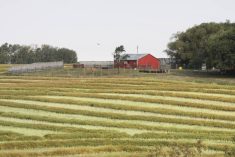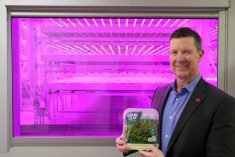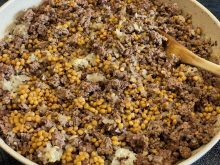Females are becoming farm owners and decision-makers, but more need to step up and be leaders, says speaker
CALGARY — Technological advancements are making farms more female friendly.
“It’s brains over brawn today,” said Maggie Van Camp, editor of Country Guide magazine.
In her own life, automated systems in her broiler chicken operation in Ontario allow her to work off the farm.
During the Advancing Women in Agriculture conference in Calgary March 7, she reflected on the changing roles of farm women from her grandmother’s time to today.
Grandma was a teacher who milked cows three times daily but had no cheque-signing authority or no land in her name, while Van Camp’s mother managed the home front and owned some land but could not sign cheques for the farm.
Read Also

Nutritious pork packed with vitamins, essential minerals
Recipes for pork
Today’s women are more visible in agriculture, citing their strong numbers in agriculture schools, industry and decision-making roles on farms.
“Women tend to be really good at managing people and systems,” said Van Camp, noting how modern agriculture is more data driven.
Citing data from the last census in Canada, she said 30 percent of farmers were women.
While the number of farmers is in decline, the number of female farmer numbers is shrinking at a slower rate.
According to U.S. Department of Agriculture numbers from 2013-14, the percentage is similar. Females who are the farm’s primary operator are more likely to run direct marketing operations on smaller farms and have off-farm employment.
She noted other trends, citing the diversity of crops, large farms and multi-dimensional farm businesses with different family members overseeing their own parts of the operation.
“(Women) want to be integral to the operations, not peripheral.”
Van Camp said the impact of more women actively involved on farms allows for more energy and intelligence in decisions and changes how farms are run and how women are regarded.
She advised not seeing farmers as men only and avoid using terms like “honey” when speaking to women.
“You would never say that to a guy who came to the farm,” said Van Camp.“If we expect others to be careful with language, we have to be careful with our responses and questions.”
Amanda Elzinga-Pugh, a purebred cattle rancher at Edgerton, Alta., and account manager with Merck Animal Health, said agriculture is steeped in tradition and plagued by misconceptions about farm women.
She said working women need to support one another to advance in a career, stop being judgmental and deflect comments like, “wouldn’t you like to be home full time?”
Gail Schafer, a sales manager with Global Ag Risk Solutions at Olds, Alta., said there is no indignity in being a mom and the person who brings meals to the field.
“It doesn’t diminish my abilities,” said Schafer, who is in charge of heifers at her family’s farm.
Based on her experience as a native of South Africa, she opposed aggressive affirmative action programs to get more women onto ag boards and into management.
“I recommend a more collaborative approach to encourage change that is less socially disruptive,” she said.
But Tiffany Atwell, director of international government affairs with DuPont, countered that women cannot patiently wait for others to let them in.
“Diversity is important,” said Atwell.
She said women need to step up and enlightened men need to help bring more women into board rooms in agriculture.
“(A woman) may be the only one there because no one thought to bring you into the room,” she said.
“Women have to step outside of roles and choose to lead,” she said, citing benefits in bringing more diverse opinions to discussions.
Atwell suggested building networks of like-minded women, getting together or using conference calls to discuss issues and joining associations and their boards.
“Don’t sit on the sidelines anymore. Don’t let the energy and inspiration die down, build a network and let this (conference) be your call to action,” she said.
Connie Stasiuk and her daughter, Kelsey, of Stasiuk Farms in Rochester, Alta., appreciated the opportunity of conferences like these to bring like-minded women together to share expertise and experiences.
“Education was very important to me and I needed it to keep me happy and keep me excited about whose I was and helped me put up with the drudgery that farming entails sometimes,” said Connie, whose jobs have ranged from farmer to hairdresser to teacher to life coach.
For Kelsey, she wanted to build on the inspiration she received from attending a previous Advancing Women conference.
“The first time, I left feeling so excited about the possibilities so I’m looking for more of that in-sight and soaking up as much information as I can,” said Kelsey, who is interested in diversification and the production side of farming.
“It’s part of a working smarter, not harder philosophy,” she said.

















